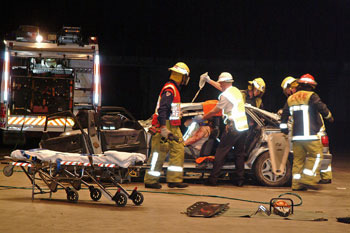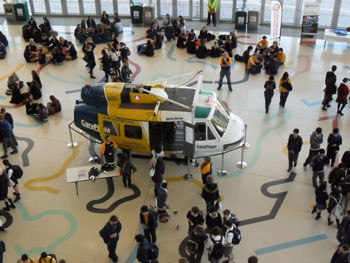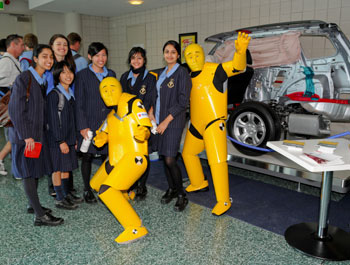Catholic Communications, Sydney Archdiocese,
13 Aug 2013
13 Aug 2013

Realistic reenactment of a car crash drives home the safety message to teens
Students in Years 10, 11 and 12 from seven of the city's Catholic high schools will be among more than 18,000 teenagers set to attend a one day crash course in road safety organised by the trauma staff of Westmead Hospital in a bid to reduce the high number of fatalities and horrific injuries from road accidents involving young people.
Held at the Allphones Arena from 20 to 22 August, more than 4500 students will attend one of the three all day forums on road safety.
This year the annual bstreetsmart all day sessions will feature realistic car crashes, testimonies from survivors of road crashes who have suffered spinal or brain injuries as well as testimonies from the recipient of a transplant whose life was saved as well as presentations from families who lost a beloved son or daughter in a road accident and made the decision to donate their organs so someone else could live.
Organised by the trauma staff of Westmead Hospital with the support of the Balnaves Foundation, bstreetsmart is now in its ninth year. Formerly known as the Youth and Road Trauma Forum, bstreetmart has helped educate more than 90,000 students from Catholic, Independent and public schools across Sydney on their responsibilities as drivers, road safety and road smarts.
The importance of the initiative has been backed up by research conducted by the University of NSW Injury Risk Management Research Centre which showed students who attended an all-day session left with a changed attitude to driving and were more likely to retain road safety messages not just for a few weeks but over an extended duration.
The program is the brainchild of Julie Steggie and Stephanie Wilson, two trauma nurses and trauma coordinators at Westmead Hospital. They came up with the idea in a bid to raise awareness about safety and responsibility on the roads and impress on teenagers the tragic consequences of a car crash not only to themselves but to others.

Senior highschoolers watch as Careflight treats victims of a car crash on the spot
"There is much more to it than whether you live or die in a crash," Stephanie says pointing out that while the result of a crash may not be death it can still change lives forever and leave someone permanently paralysed or with brain damage.
"Young peole between 15 and 30 are disproportionately represented in road trauma statistics and we remain determined to do something about this," says Julie explaining that for too long she and Stephanie were seeing too many deaths and too many young people with brain injuries or confined to wheelchairs as a result of car and motor cycle accidents.
"That's when we came up with the idea of educating as many young people as possible about their responsibilities not only when they are behind the wheel but when they are passengers in a car," she says.
Now Trauma Coordinator for the Western Sydney Local Health District, Stephanie says many of those who attend the all day bstreetmart sessions each year either have their L-plates or have just received their red P plate. But quite a large number have not yet started driving or even applied for the P plates, she says.
"What's important is not whether the students are drivers but that we get them young and instil the importance of careful and sensible driving - and as soon and as strongly as possible," she says.
Prevention through education is key and next week's 18,000 Year 10, 11 and 12 students will not only be given strategies and information about road safety, but will witness a shockingly realistic car crash. The car crash re-enactment purposefully made as real and as confronting as possible to forcefully drive home the importance of road safety.
The crash is then followed by young crash survivors telling their own stories. Among these will be some now confined to wheelchairs as a result of a car crash while others are from the Brain Injury Unit at Westmead Hospital and have suffered a traumatic brain injury either as a pedestrian, passenger or the driver of a car.
"Talking about their experiences serves as a powerful reminder of how trauma can affect anyone, Julie says and adds that some students are affected by the sight of a crash while others are impacted by the injuries and experiences of the survivors.

Crash dummies are part of the all day bstreetsmart forums
"It's never just one thing that resonates with everyone and stays with them once the session is over. It is a combination of the entire day and what they saw and learned," she says.
Many car accidents involving the under 30s are avoidable triggered by speeding, by ignoring the dangers of getting behind the wheel after two or more drinks, by the current high risk fad of drag racing and by what is increasingly being named as a major cause of accidents, talking or texting on a mobile while driving.
"Young people don't believe an accident will ever happen to them and have no understanding that to take your eyes off the road, even for a second, is a recipe for disaster," says Stephanie explaining that the serious danger of texting or talking on a mobile while driving will be one of the main focuses of next week's bstreetsmart forums.
Sydney Catholic schools with students attending the bstreetsmart forums at the Allphones Arena, Homebush on 20,21 and 22 August are Bethlehem College, Ashfield; Casimir Catholic College, Marrickville; De La Salle College, Ashfield; St Scholastica's College, Glebe; Marist Sisters' College Woolwich; Bethany College, Hurstville; St Patrick's College, Kirrawee.
To find out more about bstreetsmart log on to http://www.bstreetsmart.org/
SHARED FROM ARCHDIOCESE OF SYDNEY
Comments
Regards,
Arnold Brame